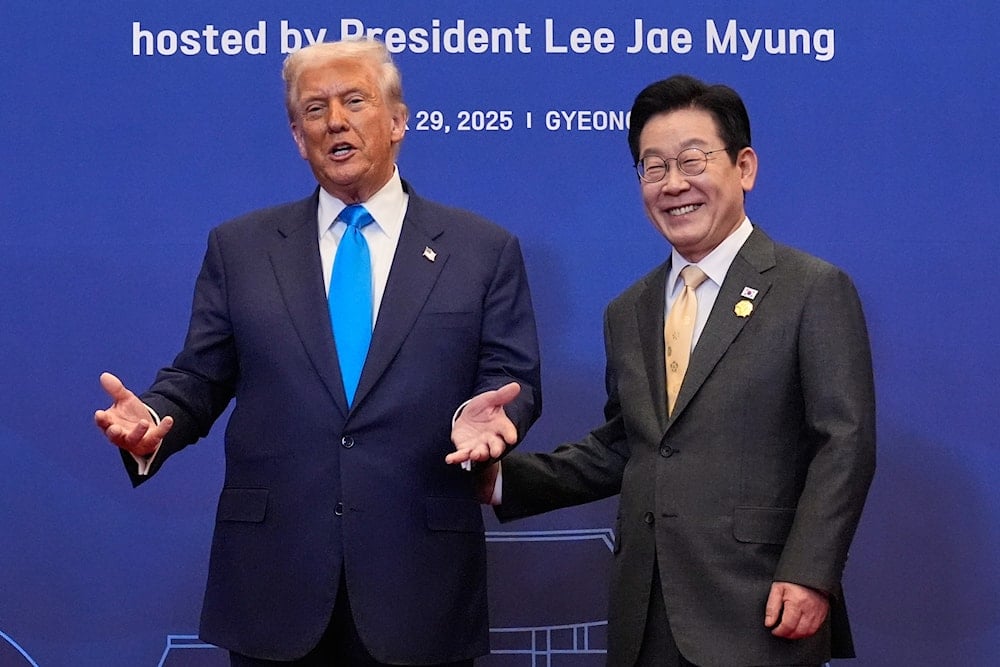South Korea, US explore nuclear submarine co-production
The US and South Korea are in early talks to co-build nuclear-powered submarines, reshaping their defense alliance and expanding naval cooperation.
-

President Donald Trump poses for a photo with South Korean President Lee Jae Myung during a dinner event in Gyeongju, South Korea, Wednesday, Oct. 29, 2025 (AP)
The US and South Korea are engaged in private negotiations for the joint construction of nuclear-powered submarines for both navies, Bloomberg reported, citing people familiar with the matter.
Following the late October meeting in South Korea between President Donald Trump and South Korean President Lee Jae Myung, where they announced a pact to enable South Korea to build its own nuclear-powered submarines in Philadelphia as suggested by Trump, a more sprawling vision has since taken shape behind the scenes, Bloomberg added, citing the sources.
A joint fact sheet on their overall trade, tariff, and defense agreement, published on Thursday evening in Washington and Friday morning in Seoul, which touched on the construction of nuclear submarines but provided no further details, served as an indication that many points remain unresolved.
Officials from both countries are now considering a plan for Korean-led joint production, potentially across sites in both countries, of submarines for both nations, a scenario that includes potentially beginning with US-class submarines, the designs for which are closely held secret, before moving to South Korea’s own design, according to the people.
Some of the sources said the discussions were partly driven by a personal request from Trump himself: when South Korea sought approval and the necessary nuclear technology to produce its own submarines, Trump privately suggested that Seoul should construct a few for the United States as well, as Washington has been looking for ways to accelerate its submarine production.
Submarine deal remains unclear
The form of any potential agreement is still highly unclear, and the discussions could easily slow down or fall apart altogether. According to the sources, both sides are only in the preliminary phase of negotiating key issues, including which submarines would be produced, the location of their construction, which country they would be designated for, and in what order they would be delivered, according to the people.
The fact sheet confirmed US approval for South Korea to build nuclear-powered submarines, with both nations pledging to collaborate on the project's requirements and fuel. It also highlighted the potential for US vessels to be built in South Korea to accelerate production, making no mention of Philadelphia.
The statement offered no specifics about the negotiations already in progress. A potential deal between Washington and Seoul would mark a major shift in their military partnership and could resemble the AUKUS arrangement that supplies Australia with nuclear-powered submarines. Still, the idea is unprecedented in several respects and would confront substantial scrutiny, obstacles, and resistance before it could realistically move forward.
Plan marred with obstacles
The joint statement leaves several questions about the submarine plan unanswered as talks continue. Currently, the Philly Shipyard is not equipped to build nuclear-class submarines. This shipyard is owned by the Korean defense giant Hanwha.
Despite this, the company is preparing to construct submarines under any final agreement. According to some of the people familiar with the matter, Hanwha has an internal target of producing two to three submarines within a decade. This production could potentially include work at the Philadelphia location.
“Hanwha Philly Shipyard was a centerpiece yard in America’s storied naval shipbuilding past, and our commitment to it will chart the way toward America’s advanced shipbuilding future,” Chief Strategy Officer of Hanhwa Alex Wong said in a statement.
According to one of the people, Trump is continuing to push for the US to receive two submarines and believes they should be provided for free, which would be a steep ask given that submarines can cost several billion dollars. Lee's office stated that characterizing South Korea as resisting US demands or that the US requested free submarines does not reflect the actual discussions.
Could nuclear energy pact undergo amendments?
South Korea, having long sought nuclear-powered submarines, requested that the US provide the necessary low-enriched uranium fuel during Lee's meeting with Trump. However, supplying this fuel for military use would require the two nations to amend their current nuclear energy pact, which explicitly prohibits such an application.
Despite Trump's apparent approval for South Korea to acquire nuclear submarines, Seoul aims to build them domestically and is seeking the necessary technology. Concurrently, the US seeks to expand its own fleet, as production of its Virginia-class submarines faces significant delays, cost overruns, and labor shortages.

 4 Min Read
4 Min Read










